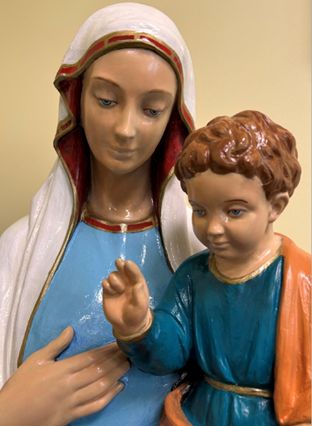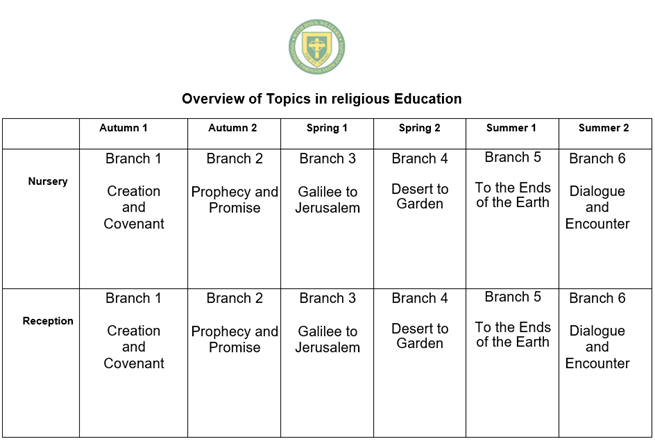Religious Education

'Our Religious Education curriculum aims to be ‘the core of the core curriculum’
Pope John Paul II.
Intent
Our intention is that St. Mary’s Catholic primary School is a place where our relationships are based on the examples of Jesus through the Gospels; as a Catholic school, religion is not just another subject in the curriculum, but it is a way of life. Religious Education is given priority and 10% of our curriculum time is spent on Religious Education. At St Mary’s we believe that Religious Education and the Catholic life of our school is at the centre of all our learning. Our intent is to provide quality Religious Education based on meeting the requirements of the R.E. Curriculum Directory 2012. Early Years has introduced and are using the new Curriculum Directory ‘To Know You More Clearly’ 2023 to teach R.E. We want children to form a relationship with God through the teaching they receive, and the experiences provided within our school and the wider community. Through the RE curriculum, we hope to support children on their faith journey. We seek to develop an ethos whereby the spiritual, moral, social and cultural needs of all within the school community are supported.
Implementation
We ensure that a minimum of 10% of curriculum time is allocated for R.E. teaching through timetabling and monitoring of work and lessons. The requirements of the R.E. curriculum are met through the scheme ‘The Way, The Truth and The Life’ which in turn meets the requirements of the Religious Education Curriculum Directory 2012 set out by the Bishop’s Conference of England Wales.
Children at St Mary’s follow “The Way, The Truth and the Life” scheme of work and also use supplemented materials. Each year group, from Year 1 to Year 6, follows six carefully planned themes and assessment is built into each theme.
The units are developmental, building on previous knowledge and experience. They take into account the children’s age and understanding. This programme aims to encourage children’s awareness of the presence of God and to help them respond to that presence. The scheme helps to enable children to learn about the Catholic faith and respond to its invitation with growing faith and love.
Through having high standards, pupils are inspired to become critical thinkers and to reflect deeply upon their own faith journey. They are challenged through the topics taught, to think about how they put the teachings of the church and Jesus into practise in their own daily lives.
Children in the Early Years have begun this year to implement the new Curriculum Directory ‘To Know You More Clearly’ 2023 when teaching R.E. Children will learn through first-hand experiences to explore, observe, problem solve, predict, think critically, make decisions and talk about their experiences. They are introduced to religious words and use their senses to explore religion and beliefs. They reflect on their own feelings and experiences. Children learn from scripture and are introduced to the Bible.
We develop children's knowledge of other faiths and cultures, giving them an understanding of the beliefs of others. Learning about the religion and cultures of those who do not share the Catholic faith is one of the ways in which we embody the call to love one’s neighbour.
Impact
Children meet the requirements of the R.E. Curriculum directory. They are happy learners within R.E. and produce good quality work which they are proud of in R.E. The children are able to use the Bible and scripture and reflect on the teachings and make links. Children of all abilities and backgrounds achieve well in R.E., they make good or outstanding progress that reveals a clear learning journey. Learning about the religion and cultures of those who do not share the Catholic faith is one of the ways in which we embody the call to love one’s neighbour. They talk enthusiastically about their learning in RE and are eager to further their learning in the next stages of their education. They are introduced to religious words and use their senses to explore religion and beliefs. They reflect on their own feelings and experiences through their learning in R.E. They achieve consistently well in all areas of Religious Education and make great progress. They will grow to know and love God, develop their moral and spiritual nature and deepen their faith.
Early Years and the New Curriculum Directory
Early Years Curriculum
The Early Years are now following the new R.E. Curriculum Directory 'To Know You More Clearly' 2023. Religious Education in the Early Years is at the heart of the Curriculum and at the core of learning.
The Early Years have implemented changes to the R.E. curriculum from the 2nd half of the Autumn Term 2023. Religious education is enriched by 'Ways of Knowing' and children will learn by understanding, discerning and responding. The children will be enabled to SEE-JUDGE-ACT in an age-appropriate way.
Each half-term the children learn about a different Branch and within each Branch the children-
- Hear -make meaningful connections between scriptural texts
- Believe - Catholic Beliefs
- Celebrate - Prayer and liturgy
- Live - The relationship of faith to life, Catholic Social Teaching
Overview of the branches Taught Each Term In Early Years

